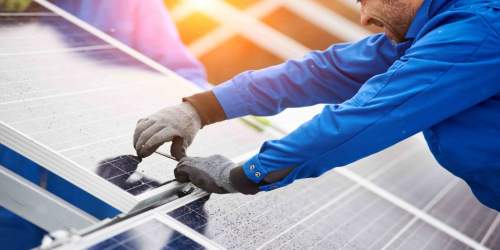Read Time : 3 Minutes
How Much Electricity Does a Solar Panel Produce?
Solar panels are one of the most popular forms of generating energy for your home. It’s renewable, clean, and reliable, making it a very desirable choice. However, many still wonder how much electricity a solar panel can produce. While a lot of this can be down to specific conditions and the type of solar panel used, there are some general criteria that can help give you a rough estimate.
How Much Energy Does a Solar Panel Produce?
Generally speaking, a 3kW or 4kW solar panel array will be able to produce enough energy to provide about 50-70% of the average UK household's demand . A 2kW or 3kW array, on the other hand, will be able to supply about 25-50% of the average UK household demand. Keep in mind, how much electricity you use, and the way you use it will determine how much your solar panels can cover. A 4kW system will, on average, generate approx. 4500kWh of electricity per year. When we break that down, we can see that it can be enough to provide:
- 6000 hours of the washing machine
- 120,000 hours of running a fridge
- 2600 hours of boiling the kettle
- 2000 hours of running an oven
Of course, every solar panel array is different, and so it can be tricky to determine exactly how much energy yours will generate. So here are some of the basic facts for the average, domestically used, solar panel system.
- Domestic systems tend to range from 1 kilowatt (kW) to 5kW in size.
- A 1kW system can produce around 850 kWh/s per year on average, a 2kW system 1,700kWh/s per year, and a 5kW system 4,500kWh/s per year.
- The Energy Saving Trust (EST) estimates that a typical three-bedroom home in the UK will use just over 3,000kWh/s per year. So, a 4kW or 5kW system could, theoretically, cover this
- Any excess electricity not used by your home and sent back to the grid, could be applicable for the Smart Export Guarantee (SEG).
COMPARE PRICES FROM LOCAL INSTALLERS
Compare prices from local companies fast & free
Enter your postcode to compare quotes from leading professionals. We promise to keep your information Safe & Secure. Privacy Policy
The amount of electricity a 4kW solar panel system will produce depends on several factors, including location, orientation, shading, and the number of sun hours in your area. To estimate the annual energy production, you can use the following formula:
Annual Energy Production (kWh) = System Size (kW) × Daily Sunlight Hours × 365
For a rough estimate, if you assume an average of 4 sunlight hours per day, the annual energy production would be:
4 kW × 4 hours/day × 365 days/year = 5,840 kWh/year
This is an equation for calculating the max output of a solar array in optimal conditions. In reality, factors like panel efficiency, shading, the angle and direction of your panels, weather conditions and solar irradiance all impact the actual electrical output. To get a more accurate estimate, it's recommended to consult with a local solar installer.
What Determines the Amount of Electricity Produced?
There are four main factors that will determine how much electricity your solar panels will be able to produce for your home. These are as follows:
Size: Or Watts installed. This is the most important factor out of the four, as the larger the system is, the more electricity it will produce. If you are looking at a typical installation, it is a 4kW system and this tends to be around 10-14 panels. Alternatively, a 1kw domestic system is likely to only be 3-4 panels.
Orientation: This is the next most important factor. The direction in which your roof faces and its angles are more important than you might think. For optimum performance levels and efficiency, your panels should be facing south at an angle of 35 degrees but orientation east to west through south is usable and any pitch between 15 and 45 degrees.
Shade: The area of your roof that has the solar panels installed should not be in the shade during the day. Allowing the panels to be in the sunlight all day will increase the amount of electricity that you are able to produce.
Seasons: The time of year can also have an impact on efficiency and energy production. During the summertime, there are longer hours of daylight, so you will be able to produce a lot more power. However, it is also important to remember that solar panels actually work by capturing light as opposed to heat, so it will produce energy throughout the year.
How to Tell How Much Electricity is Being Generated
When you go to have your solar panels installed, they will come with a meter that is placed in an accessible location within your home. What this meter does is record the amount of electricity that is being produced by the solar system, as well as how much electricity they are exporting back to the National Grid. This then allows you to work out how much you will be paid by Smart Export Guarantee (SEG).
Solar panel manufacturers are also starting to develop online apps for your smartphone that will allow you to access the performance levels of your solar panel. This can be done either via the app, or online from your computer. To get the most out of your solar panels and the electricity that is produced by them, you should ensure that you use your appliances (washing machine, dishwasher, vacuum, etc.) during the day as much as possible. This is because it is during the day that the panels will be generating energy.
You should also try to ensure that your home is as energy efficient as possible. This allows you to get the most out of your free energy. Try to use energy saving lightbulbs, and don’t leave electronic devices on standby if you can help it, as these are all contributing factors to excessive energy consumption. Try, also, to only use the washing machine on a full load.
Of course, it can be easy to forget about our solar panels. They don’t require much maintenance (just an occasional wash), and they automatically power your home. However, make sure you check them over at least once a month to make sure they are working to the best of their ability to provide you with energy.
Want to Know More?
Have you found yourself interested in solar panels? If you're interested in booking in a quote then you can use our directory of renewable energy installation companies to find an approved installer in your area. Or simply give us a ring using the number at the top of this page and have a chat.
Find a local installer
Welcome to the biggest directory of UK renewable energy companies





 How Much do Solar Panel Systems Cost in 2024?
How Much do Solar Panel Systems Cost in 2024?







